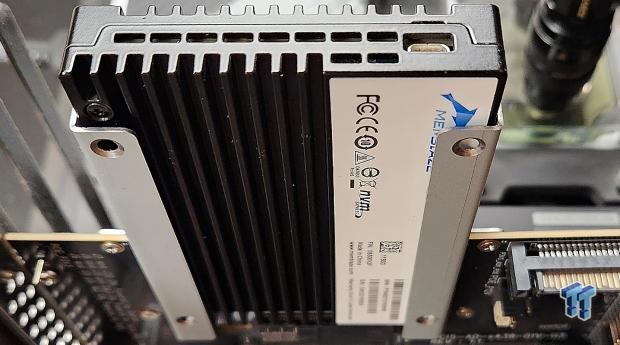
The Bottom Line
Pros
- + Pure read workloads
- + Random
- + Sequential
Cons
- - Low queue depth random writes
Should you buy it?
AvoidConsiderShortlistBuyIntroduction and Drive Details
Having become thoroughly ingrained within the consumer space, PCIe Gen5 SSDs are now making their way into datacenters across the globe. With double the potential throughput of PCIe Gen4, PCIe Gen5 has a lot to offer in terms of TCO as measured by IOPS per watt. PCIe Gen5 SSDs can deliver as much as double the IOPS within a relatively similar power envelope, making PCIe Gen5 SSDs overall more efficient than PCIe Gen4 as measured in IOPS per watt.
The SSD we have in for review is the second PCIe Gen5 datacenter SSD we've tested to date. The first is KIOXIA's CM7-V 3-DWPD, 2.8 million IOPS capable, mixed workload specialist, which pretty much laid waste, in terms of performance, to all flash-based SSDs that came before it.
Today's PCIe Gen5 contender comes from the China-based enterprise SSD company Memblaze. Memblaze is a leading provider of enterprise-class SSD products and solutions, founded in Beijing in 2011, the PBlaze series of enterprise SSDs launched by Memblaze are currently being widely used in database, virtualization, cloud computing, big data, artificial intelligence, and other fields, providing stable and reliable high-speed storage solutions for Internet, cloud services, finance, and telecommunications industries.
Memblaze has been committed to independent development and innovation, owning over 200 flash technology patent applications, covering key areas such as flash memory management, data protection, power control, and hardware design, and has R&D centers in Beijing, Shanghai, Suzhou, and Chengdu.
Okay, so now that we have an understanding of who and what Memblaze is, let's turn our focus to the subject of today's review, the Memblaze PBlaze7 P7946 6.4TB PCIe Gen5 SSD. The P7946 is a 3-DWPD mixed workload variant of the PBlaze7 P7940 series, capable of up to 14,000 MB/s sequential throughput and up to 2.8 million IOPS of random throughput. Quite similar to the CM7-V and is indeed intended to fill the same roles in the datacenter.
Now, before we get into our regular test suite, we want to mention that the P7946 we are reviewing today is factory rated for up to 2.8 million IOPS at QD256 running on a Linux -based platform. We mention this because part of what we do here is verify that our test subject can indeed deliver quoted up-to-performance metrics. With our normal test configuration, we exceeded all stated up-to-performance metrics except for 4K random read, where we peaked at 2.18 million IOPS at QD256.
Our normal test configuration is Windows Datacenter 2022 based using 8-CPU threads at up to QD256, and just as we did with the CM7-V 3.2TB, we did a standalone test using 16-CPU threads at QD512, and we did indeed attain 2.8 million IOPS from our Marvell Gen5 controlled contender:
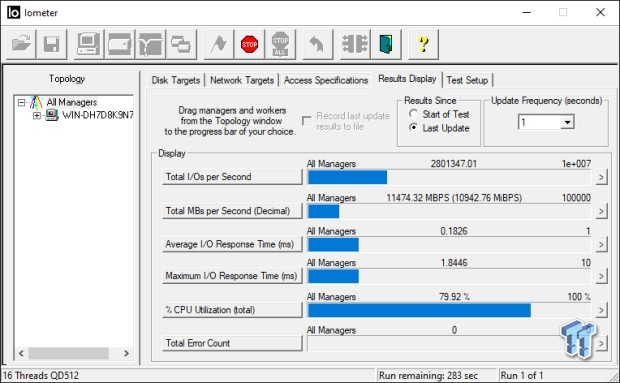
The P7940 Series can indeed deliver advertised random throughput even on a less efficient Windows Server-based platform. Impressive.
We wanted to show this upfront because we won't be changing our normal test configuration of 8-CPU threads at up to QD256 because there is no compelling reason for us to do so. Even QD256 is well beyond where even datacenter SSDs typically run workloads at. Additionally, 8-CPU threads vs. 16-CPU threads at QD128 proved to be identical at 1.53 million IOPS. In short, we are of the considered opinion that our normal test configuration is plenty sufficient to replicate real-world performance operating within a realistic queue depth range, even for PCIe Gen5 SSDs.
Specs/Comparison Products
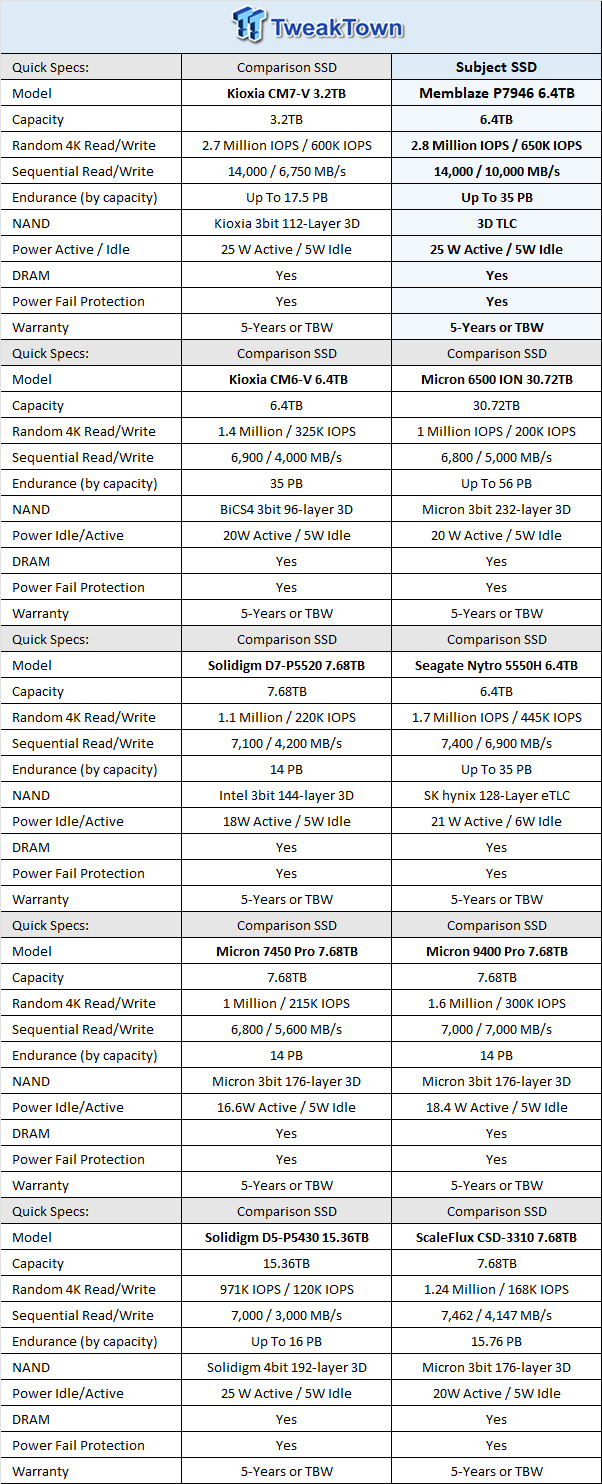
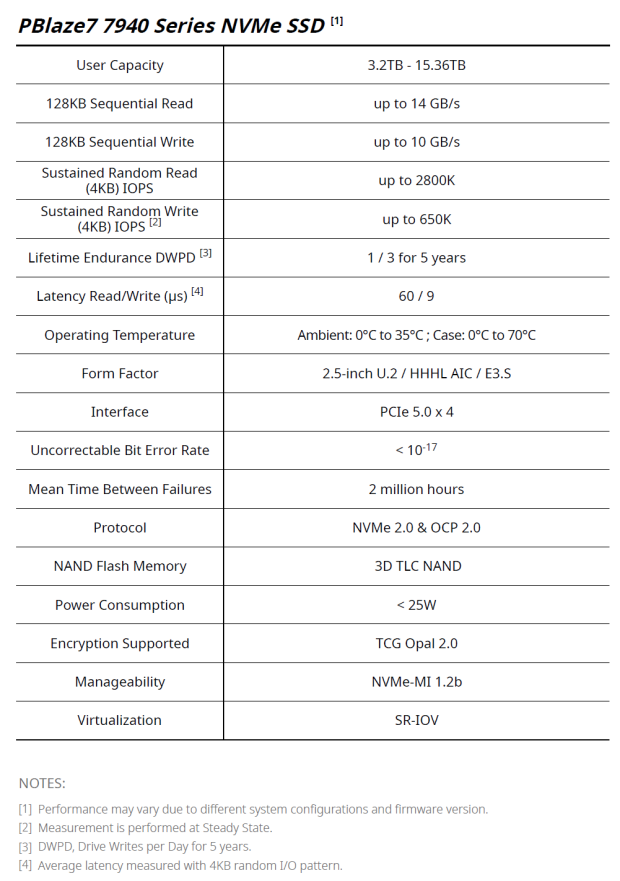
Memblaze offers its PBlaze7 P7940 series at capacity points ranging from 3.2TB -15.36TB across three form factors, including 2.5-inch U.2, HHHL AIC and E3.S
Memblaze P7946 6.4TB NVMe PCIe Gen5 x4 U.2 SSD
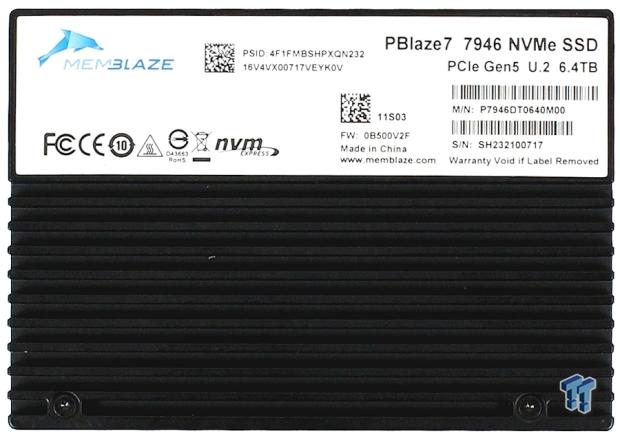
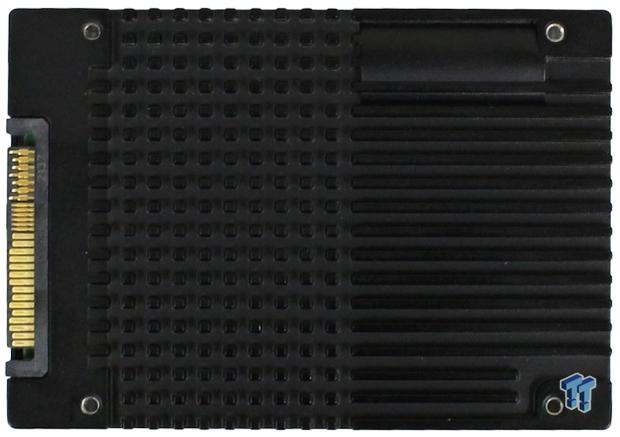
Enterprise Testing Methodology
TweakTown strictly adheres to industry-accepted Enterprise Solid State Storage testing procedures. Each test we perform repeats the same sequence of the following four steps:
- Secure Erase SSD
- Write the entire capacity of SSD a minimum of 2x with 128KB sequential write data, seamlessly transition to the next step
- Precondition SSD at maximum QD measured (QD32 for SATA, QD256 for PCIe) with the test-specific workload for a sufficient amount of time to reach a constant steady-state, seamlessly transition to the next step
- Run test-specific workload for 5-minutes at each measured Queue Depth, and record results

Benchmarks - Random and Sequential
4K Random Write/Read
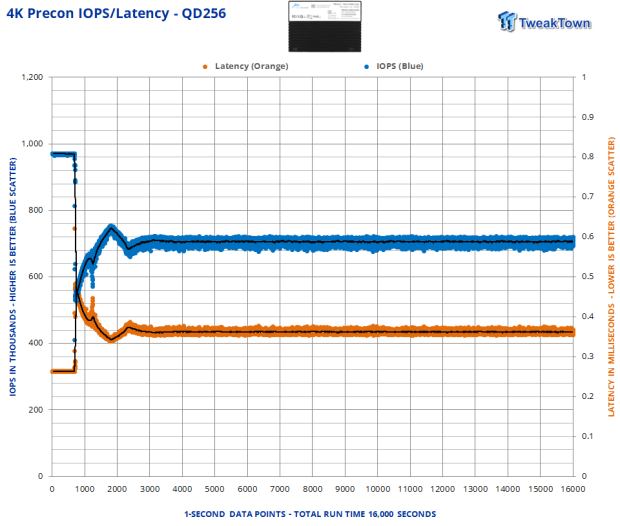
We precondition the drive for 16,000 seconds, receiving performance data every second. We plot this data to observe the test subject's descent into steady-state and to verify steady-state is in effect as we seamlessly transition into testing at queue depth. Steady-state is achieved at 4,000 seconds of preconditioning. The average steady-state write performance at QD256 is approximately 705K IOPS.
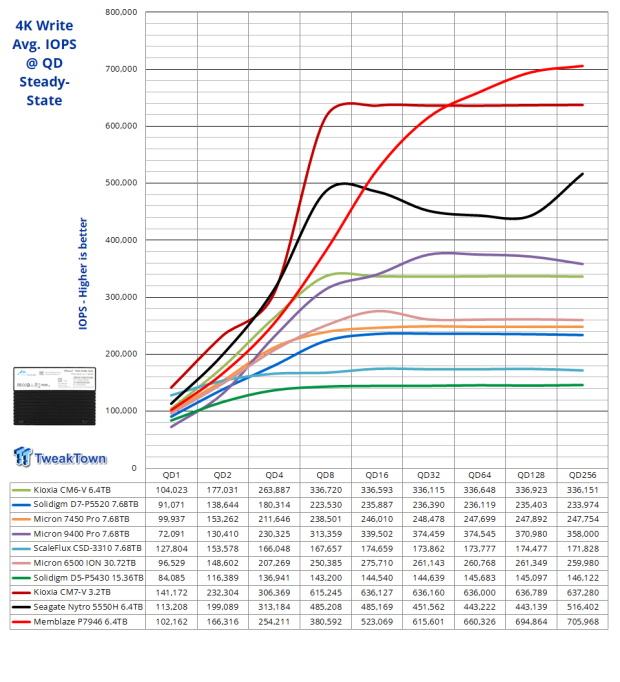
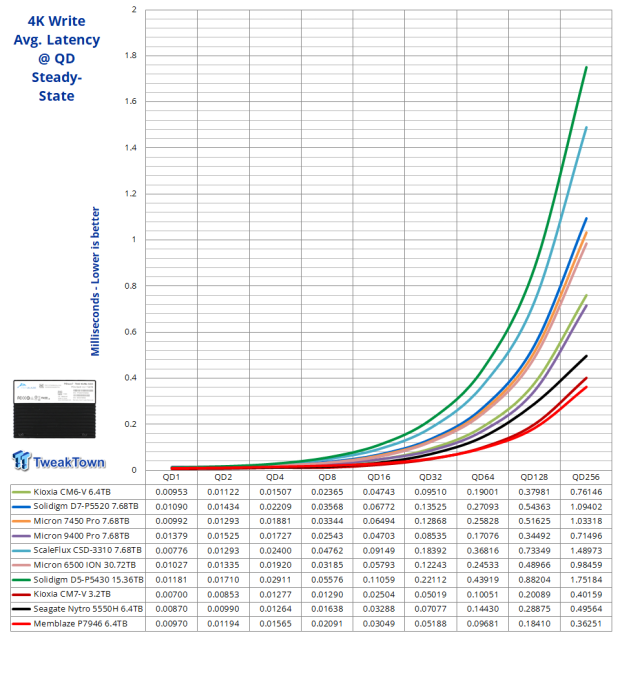
We hit a max of 706K IOPS sustained at QD256, and while that is a new lab record for a flash-based datacenter SSD at that queue depth, the overall performance curve here isn't as good as what the CM7-V 3.2TB can do. We always prefer higher performance at lower queue depths.
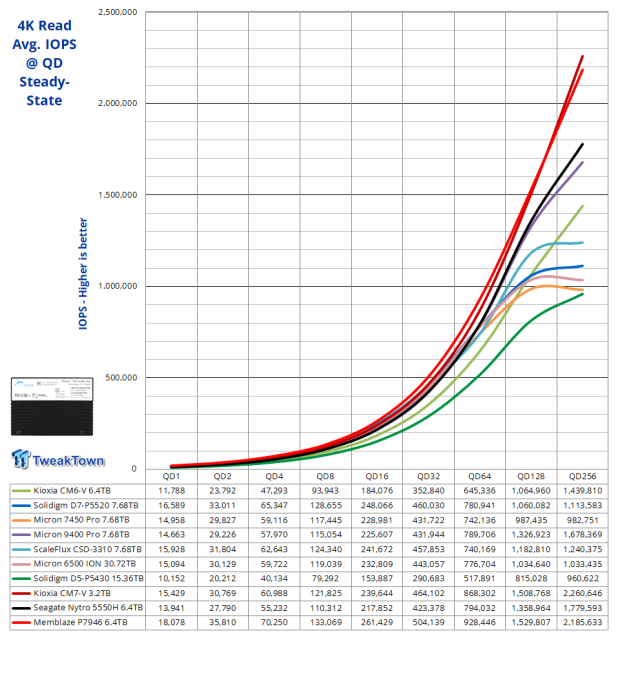
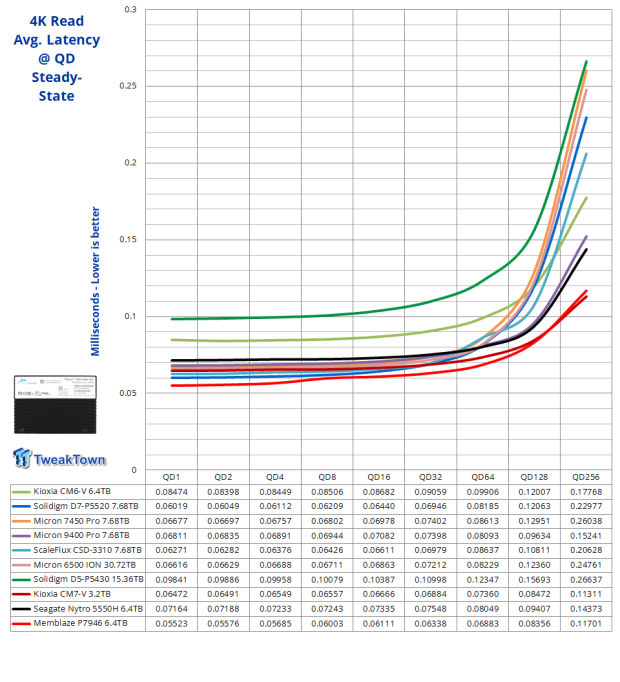
As we explained previously when using 8-CPU threads at QD256, we top out at 2.18 million 4K random read IOPS, but as also shown previously, the drive is capable of up to at least 2.8 million IOPS. At the 2.185 million IOPS shown here, our test subject does not peak quite as high on our configuration as the CM7-V 3.2TB.
However, the P7946 delivers better performance at queue depths of up to 128, so it is the clear winner here. We should also point out that in comparison to the CM7-V, which is considerably more performant at 3.2TB than at other capacities, our test subject can, we assume, deliver this very same level of performance across all capacity points. Impressive.
8K Random Write/Read
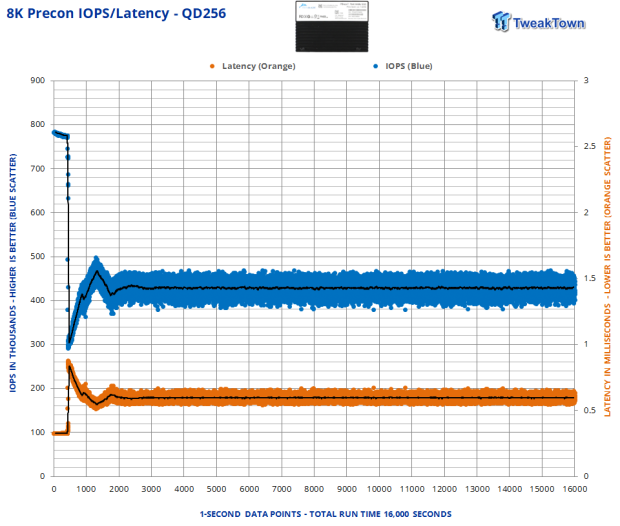
We precondition the drive for 16,000 seconds, receiving performance data every second. We plot this data to observe the test subject's descent into steady-state and to verify steady-state is in effect as we seamlessly transition into testing at queue depth. Steady-state is achieved at 3,000 seconds of preconditioning. The average steady-state write performance at QD256 is approximately 430K IOPS.
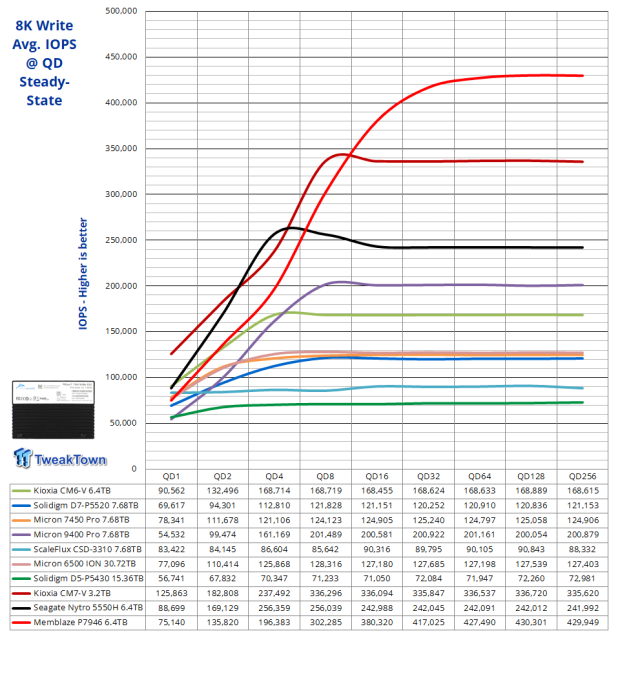
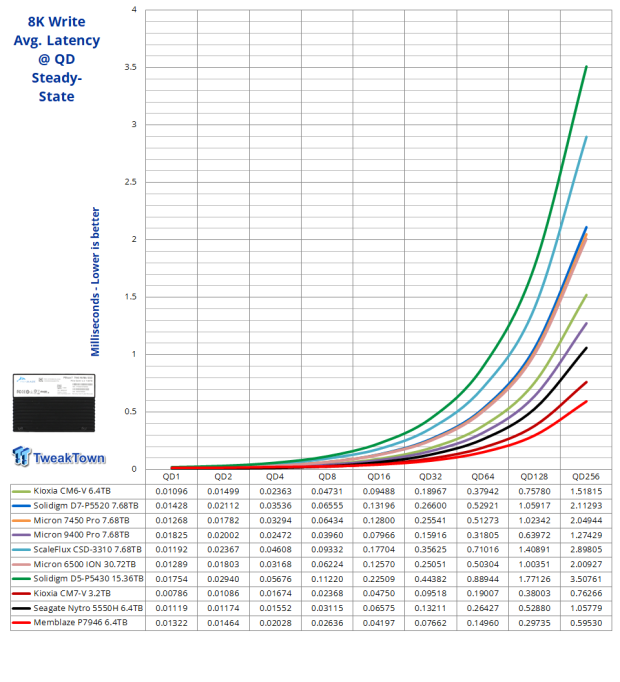
We expect 8K random to track pretty much the same as 4K random here, just at a lower rate because it's moving twice the amount of data. Overall our test subject fares significantly better with pure 8K aligned writes than it does at 4K, able to deliver lab records at QD16 and higher.
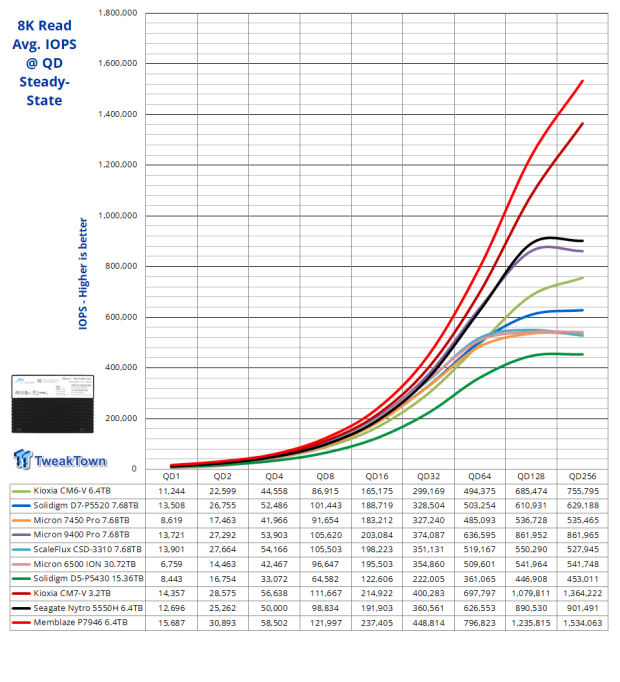
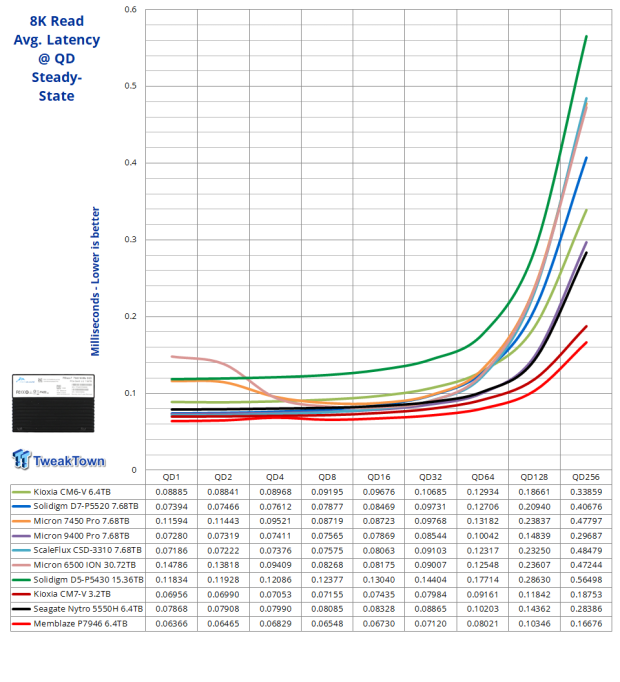
The P7946's affinity for 8K aligned data is further demonstrated here with the drive able to surpass our previous champion, the CM7-V 3.2TB, at every measured queue depth.
128K Sequential Write/Read
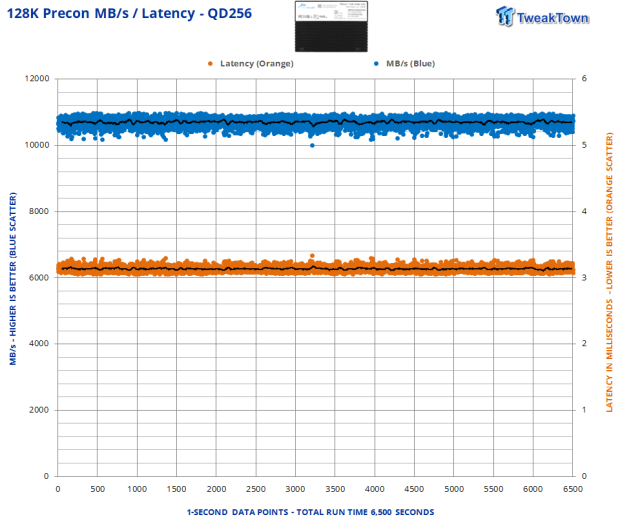
We precondition the drive for 6,500 seconds, receiving performance data every second. Steady-state for this test kicks in at 0 seconds. The average steady-state sequential write performance at QD256 is approximately 10,700 MB/s.
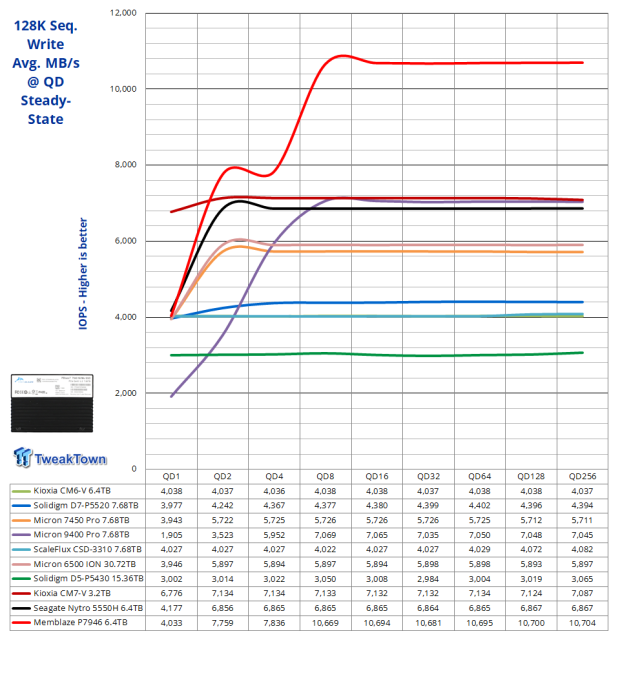
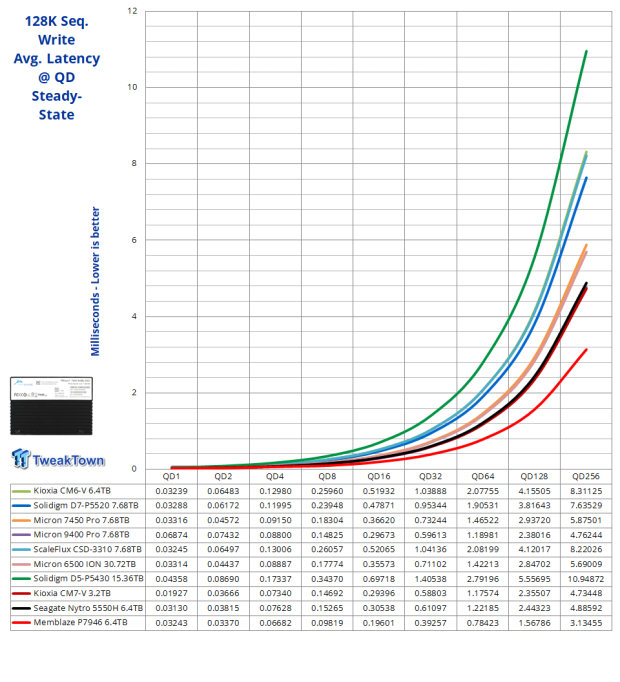
At queue depths of two or more, our test subject demonstrates by far the highest sequential write throughput we've ever attained from any enterprise SSD. At queue depths of 8 or more, it is delivering 66% more throughput than the next closest competitor.
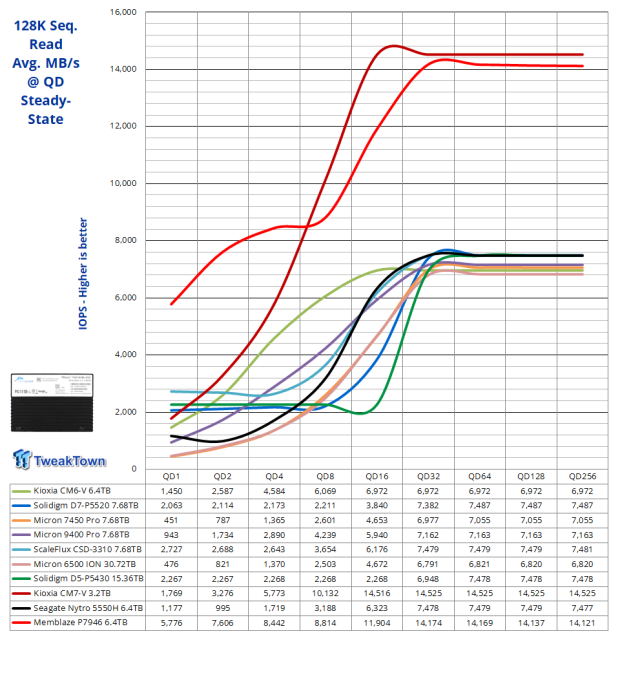
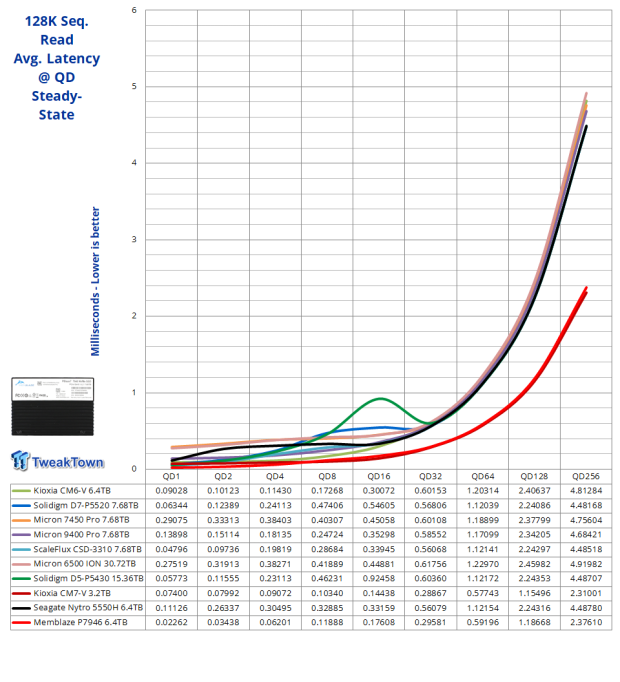
Although the CM7-V 3.2TB can deliver a few hundred megabytes more than our test subject at its peak, we still give the win to the P7946 by a wide margin due to its vastly superior low queue depth performance. In fact, at QD1, our test subject delivers more than 2.1x the performance of the next closest contender, the CSD 3310.
Benchmarks - Workloads
4K 7030
4K 7030 is a commonly quoted workload performance metric for Enterprise SSDs.
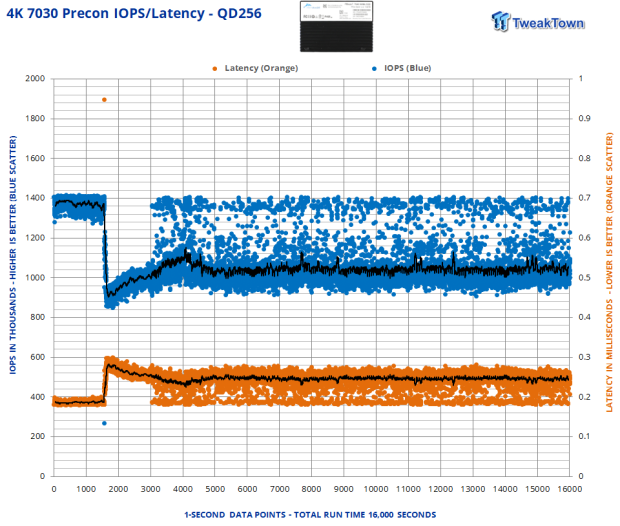
We precondition the drive for 16,000 seconds, receiving performance data every second. We plot this data to observe the test subject's descent into steady-state and to verify steady-state is in effect as we seamlessly transition into testing at queue depth. Steady-state is achieved at 5,000 seconds of preconditioning. The average steady-state performance at QD256 is approximately 1,038K IOPS.
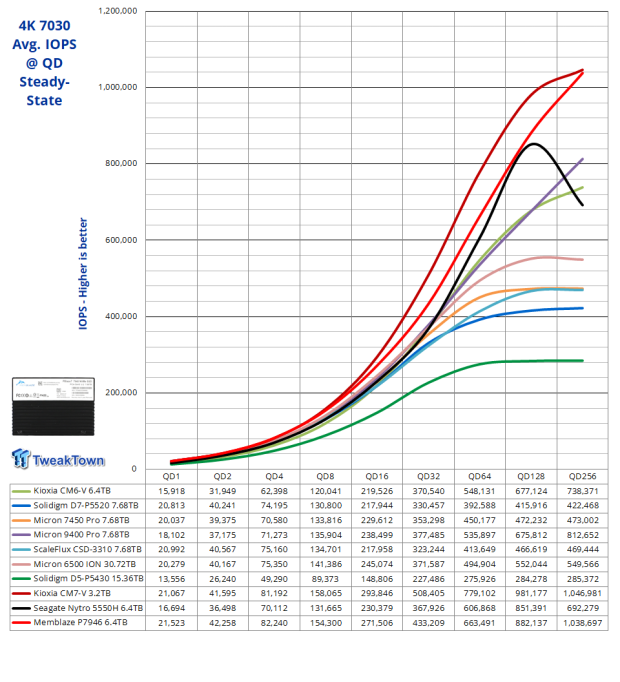
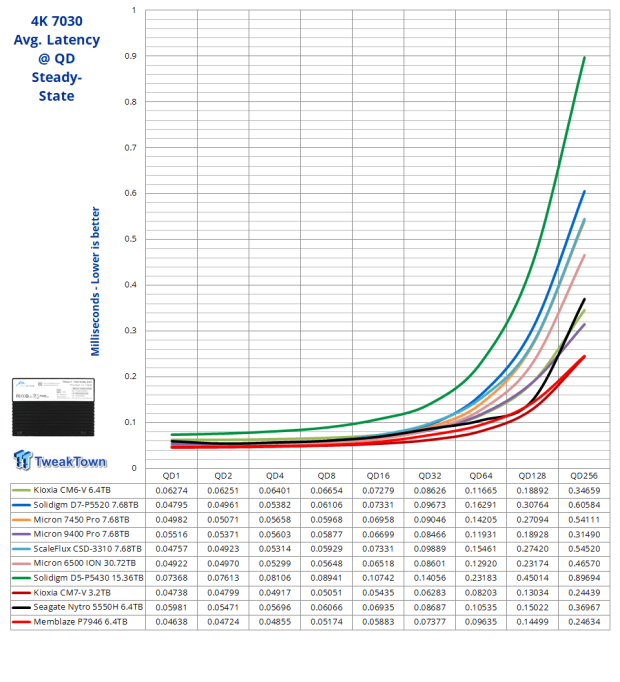
The P7946 gives us exactly what we are looking for at queue depths of up to four, after which the CM7-V 3.2 TB begins to deliver more and, at points up to QD128, does so significantly. Performance, for the most part, reaches parody with the CM7-V 3.2TB at QD256. Tough to say with certainty who is the winner here.
Email Server
Our Email Server workload is a demanding 8K test with a 50 percent R/W distribution. This application gives a good indication of how well a drive will perform in a write-heavy workload environment.
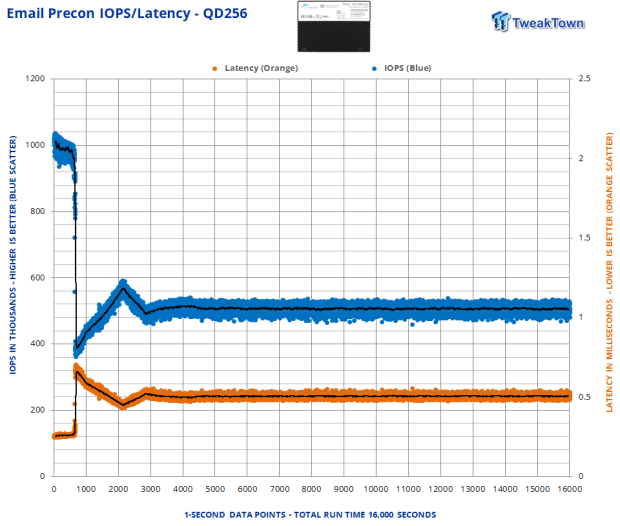
We precondition the drive for 16,000 seconds, receiving performance data every second. We plot this data to observe the test subject's descent into steady-state and to verify steady-state is in effect as we seamlessly transition into testing at queue depth. Steady-state is achieved at 5,000 seconds of preconditioning. The average steady-state performance at QD256 is approximately 505K IOPS.
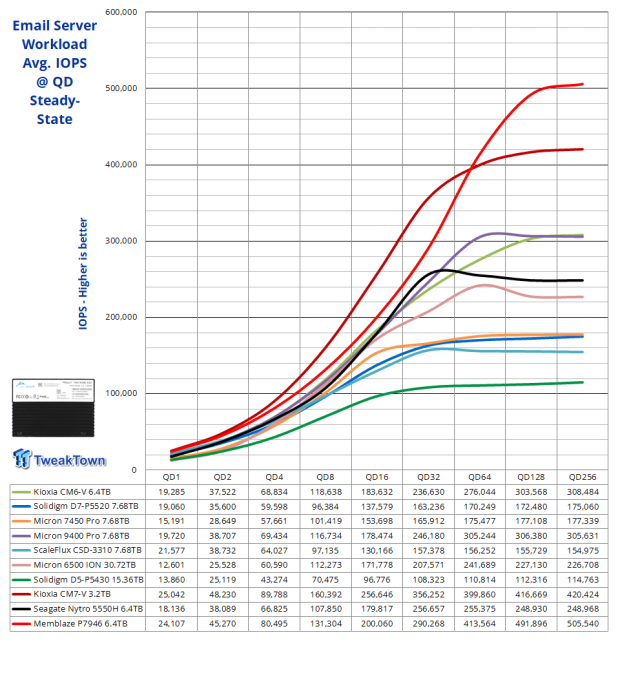
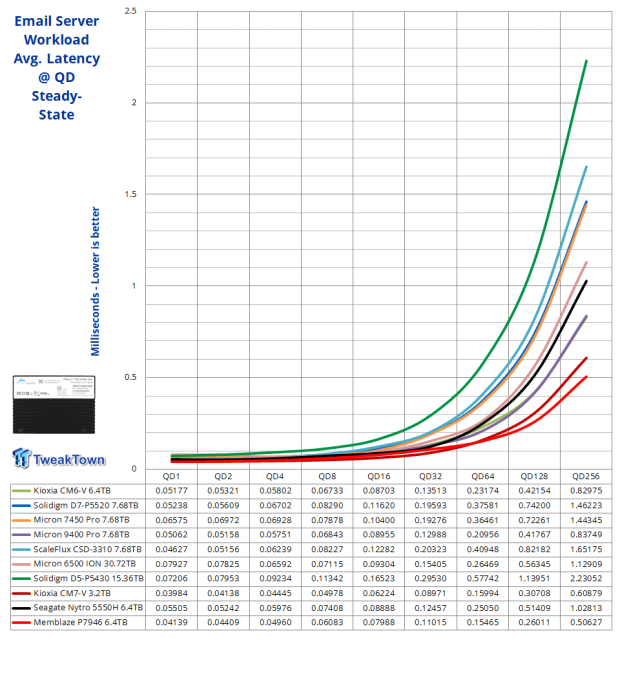
We believe what we see here is the P7946's rather average low queue depth random write performance is holding it back in comparison to the CM7-V 3.2TB. Meanwhile, performance at queue depths of 64 and higher is, as expected, the best we've ever encountered. Overall we favor the 3.2TB CM7-V's performance curve here.
OLTP/Database Server
Our On-Line Transaction Processing (OLTP) / Database workload is a demanding 8K test with a 66/33 percent R/W distribution. OLTP is online processing of financial transactions and high-frequency trading.
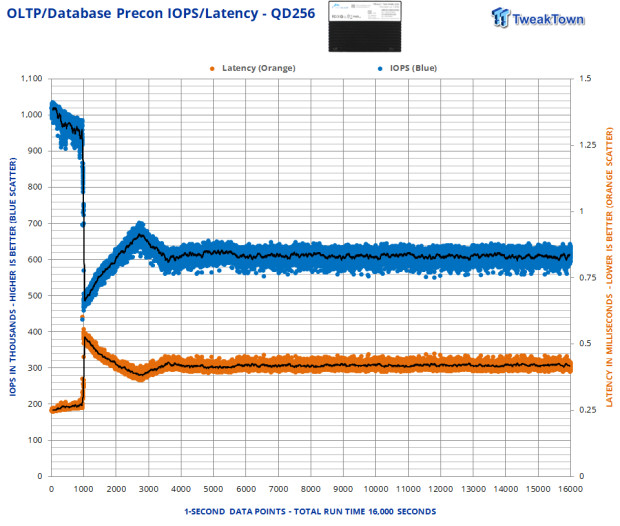
We precondition the drive for 16,000 seconds, receiving performance data every second. We plot this data to observe the test subject's descent into steady-state and to verify steady-state is in effect as we seamlessly transition into testing at queue depth. Steady-state is achieved at 6,000 seconds of preconditioning. The average steady-state performance at QD256 is approximately 608K IOPS.
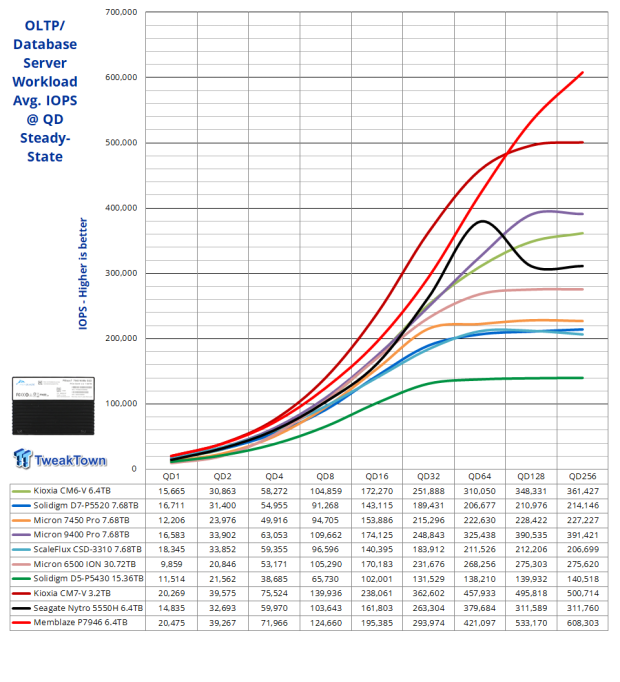
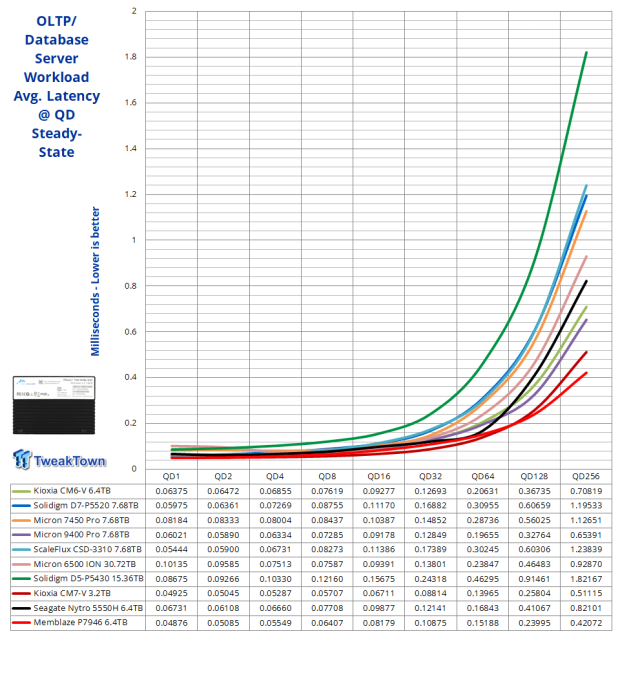
Although the P7946 delivers new lab records at QD1, QD128, and QD256, we again prefer the performance curve we get from KIOXIA's CM7-V 3.2TB SSD.
Web Server
Our Web Server workload is a pure random read test with a wide range of file sizes, ranging from 512B to 512KB at varying percentage rates per file size.
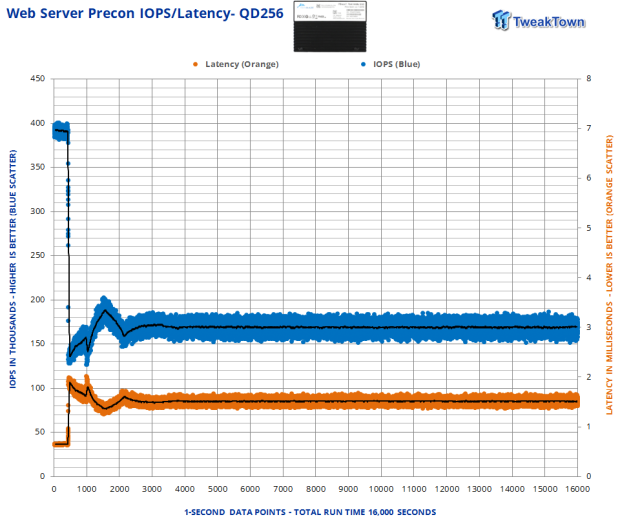
We precondition the drive for 16,000 seconds, receiving performance data every second. We plot this data to observe the test subject's descent into steady-state and to verify steady-state is in effect as we seamlessly transition into testing at queue depth. We precondition for this test with an inverted (all-write) workload so that no relevant information can be gleaned from this preconditioning other than verification of steady-state.
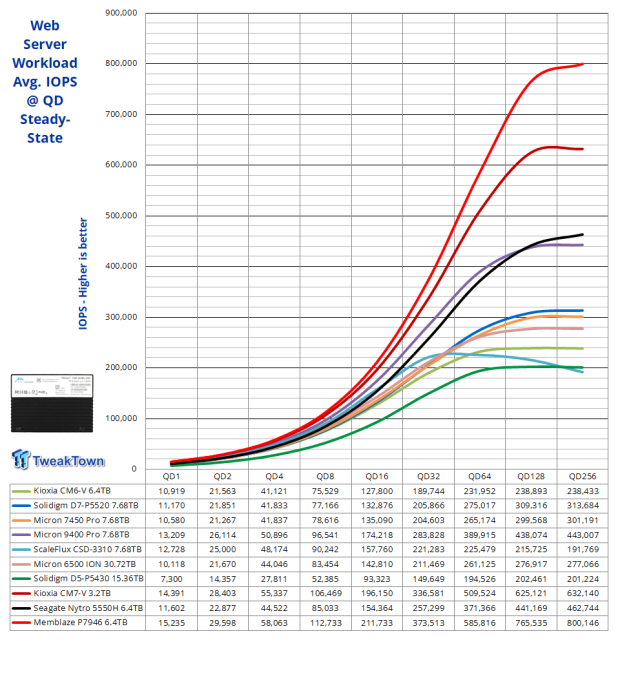
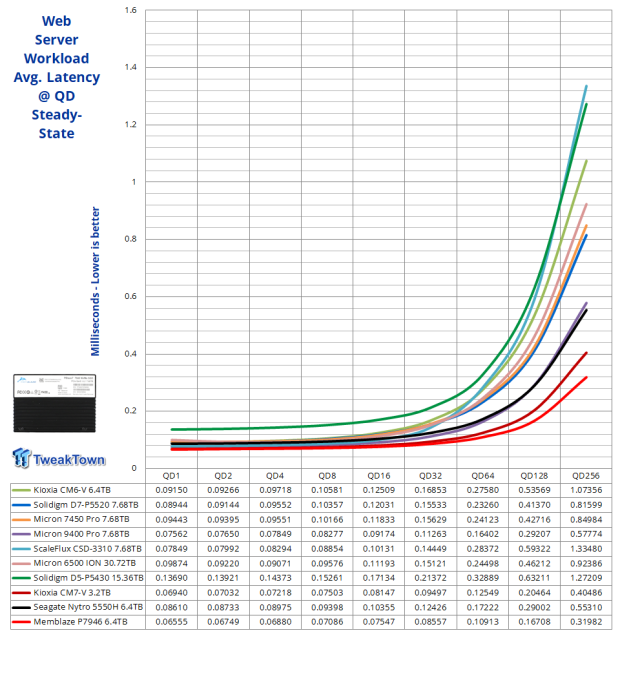
We consider this test to be the most taxing test we run, and as such, we are blown away with what our test subject is delivering across the board, culminating in a massive 800K IOPS at QD256, which is 26% better than our previous champion the CM7-V 3.2TB. Impressive.
Final Thoughts
As it stands as we write our report, forming an educated opinion on what the Memblaze PBlaze7 P7940 Series PCIe Gen5 datacenter SSDs are all about, we can start with the obvious, even if it's somewhat inferred for untested capacity points. When we take all capacities into account and the fact that the CM7-V is significantly more performant at 3.2TB than at any other capacity point, while the PBlaze 7946 can deliver as good or even better than KIOXIA's best at double the capacity, we can infer the Memblaze PBlaze7 P7946 series to be more efficient based on footprint alone.
If we want to stretch our inference further, we can extend this into the entire PBlaze7 P7940 series as a whole as likely being overall more performant, to which we can infer overall more efficient as well. One more point that is again tied inextricably to efficiency is heat. The Memblaze drive in U.2 form runs 15 to 20c cooler than the CM7-V in similar 2.5" form factor.
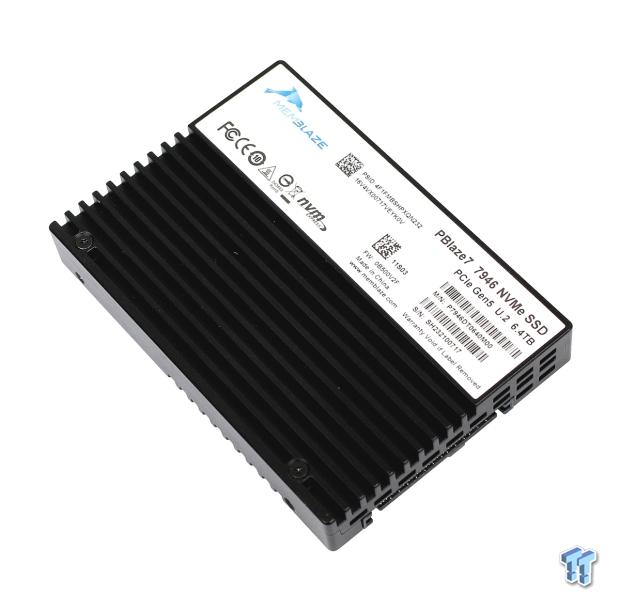
The second PCIe Gen5 datacenter SSD we've ever tested hails from China and is arguably the highest-performing flash-based SSD we've ever tested. Editor's Choice.

